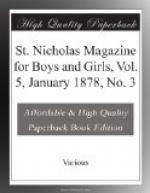At the close of the dance and chorus, Chan retired into the tea garden, and drank so many cups of the national beverage, with such comic gestures, that the spectators were almost sorry when the opening of the opposite window drew all eyes in that direction. At the lattice appeared a lovely being; for this potato had been pared, and on the white surface were painted pretty pink cheeks, red lips, black eyes, and oblique brows; through the tuft of dark silk on the head were stuck several glittering pins, and a pink jacket shrouded the plump figure of this capital little Chinese lady. After peeping coyly out, so that all could see and admire, she fell to counting the money from a purse, so large her small hands could hardly hold it on the window seat. While she did this, the song went on to explain:
“Miss Ki Hi was short and
squat,
She had money and he had not;
So off to her he resolved
to go,
And play her a tune on his
little banjo.”
During the chorus to this verse Chan was seen tuning his instrument in the garden, and at the end sallied gallantly forth to sing the following tender strain:
“Whang
fun li,
Tang
hua ki,
Hong Kong do ra me!
Ah
sin lo,
Pan
to fo,
Tsing up chin leute!”
Carried away by his passion, Chan dropped his banjo, fell upon his knees, and, clasping his hands, bowed his forehead in the dust before his idol. But, alas!—
“Miss Ki Hi heard his notes
of love,
And held her wash-bowl up
above;
It fell upon the little man,
And this was the end of Chingery
Chan.”
Indeed it was: for, as the doll’s basin of real water was cast forth by the cruel charmer, poor Chan expired in such strong convulsions that his head rolled down among the audience. Miss Ki Hi peeped to see what had become of her victim, and the shutter decapitated her likewise, to the great delight of the children, who passed around the heads, pronouncing a “Potato” pantomime “first-rate fun.”
Then they settled themselves for the show, having been assured by Manager Thorny that they were about to behold the most elegant and varied combination ever produced on any stage. And when one reads the following very inadequate description of the somewhat mixed entertainment, it is impossible to deny that the promise made was nobly kept.
After some delay and several crashes behind the curtain, which mightily amused the audience, the performance began with the well-known tragedy of “Blue-beard”; for Bab had set her heart upon it, and the young folks had acted it so often in their plays that it was very easy to get up with a few extra touches to scenery and costumes. Thorny was superb as the tyrant with a beard of bright blue worsted, a slouched hat and long feather, fur cloak, red hose, rubber boots, and a real sword which clanked tragically as he walked. He spoke in such a deep voice, knit his corked eyebrows, and glared so frightfully, that it was no wonder poor Fatima quaked before him as he gave into her keeping an immense bunch of keys with one particularly big, bright one, among them.




